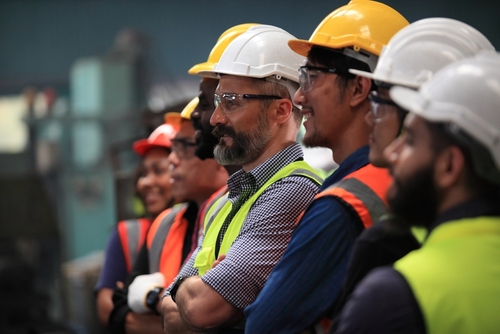
Conservative policy experts denounced passage on Monday by the Pennsylvania General Assembly’s Democrat-heavy House Labor and Industry Committee of a state constitutional amendment that would give the commonwealth’s workers the right to organize.
“This proposal is a dangerous and far-reaching attack on Pennsylvania’s workers,” Matthew Brouillette, president and CEO of the Commonwealth Partners Chamber of Entrepreneurs, wrote in an email this morning. “It’s a monumental political handout to union executives and would enable them to strip workers of their rights and coerce workers into joining and paying a union that they may neither need nor want.”
Notably, added Brouillette, these same union executives donate millions of dollars to the campaigns of the lawmakers who favor this bill.
David Osborne, Senior Fellow for Labor Policy with the Commonwealth Foundation, a conservative policy center, said the proposed measure aims to “constitutionalize” union activity and allow collective bargaining agreements to trump state law.
“Lawmakers would be powerless to stop union executives from conducting unending strikes, bargaining in bad faith, or coercing employees into becoming members,” Osborne said.
The PA House Labor and Industry Committee on May 1 voted 12-9 along party lines to approve House Bill (HB) 950, which PA Rep. Elizabeth Fiedler (D-Philadelphia) sponsored last month alongside 29 other Pennsylvania lawmakers. The bill now heads to the House floor for a vote.
Currently, the Pennsylvania constitution does not guarantee workers the right to organize and collectively bargain. HB 950 proposes to amend Article I of the Pennsylvania Constitution to ensure such rights for all workers in the state, and would prohibit any other laws that may interfere with or diminish collective bargaining rights, according to the bill’s text.
Fiedler said in a statement on Monday that the passage of H.B. 950 is a step in the right direction for Pennsylvania workers.
“Workers fuel our economy. They are the mothers, fathers, aunts and uncles of our commonwealth,” said Fiedler. “Workers deserve to be treated with respect and that’s exactly the goal of this legislation. The Workers’ Rights Amendment will support workers in using their numbers to secure better pay, hours and working conditions.”
However, in an email sent yesterday to Pennsylvania Business Report, Osborne noted that HB 950 would give too much power to union chiefs at the expense of workers, while infringing on legislative authority.
“No legislator should vote for a constitutional amendment that cedes their own legislative responsibilities to unaccountable union executives, and that’s just what would happen under HB 950,” he wrote. “HB 950 will help union executives, not employees. Public employees lose statutory protections from coercive union executives, and HB 950 attempts to force workers into becoming union members just to keep their job.”
If enacted, Brouillette also pointed out that HB 950 would effectively eliminate the state’s representative form of government and would set up a shadow government composed of union leaders who aren’t elected by nor answerable to state residents.
“Because HB 950 is a proposed constitutional amendment, it would elevate union contracts above state law and prohibit the legislature from passing measures to protect workers’ rights,” said Brouillette. “It would deny workers their right to free association by allowing unions to require membership (and membership dues) as a condition of employment.”
Additionally, HB 950 would give union executives extensive control over state laws that could lead to tax increases, he said, “because union contracts, including government union contracts, would supersede state law.”
Both Brouillette and Osborne think there are better ways to protect workers’ rights in the commonwealth.
“Enhancing democracy and increasing accountability for union executives is the path to protecting workers’ rights,” said Osborne, who cited a May 2022 Commonwealth Foundation statewide Pennsylvania survey showing that 88 percent of Pennsylvania voters believe unions should have to periodically run for reelection.
“Allowing workers to resign their union membership at any time and ending government’s automatic payroll deduction of union dues are also popular,” Osborne said. “HB 950 would prevent the General Assembly from enacting these reasonable reforms.”
Brouillette suggested that state lawmakers pass reforms that inform workers of their right to join or not join a union, as well as those that allow workers to leave a union whenever they choose. “Currently, workers are often trapped in union membership except for narrow 15-day windows at the end of multi-year contracts,” he said.
At the same time, PA lawmakers should enact reforms that require written consent from workers for union membership rather than allowing unions to presume membership, and permit workers to represent themselves, if they so choose, in contract negotiations, according to Brouillette.
And other reforms should be adopted that end taxpayer-funded collection of union dues and campaign contributions, he said.
“All of these proposals have been introduced in the past, and if lawmakers truly want to protect workers’ rights, these are the reforms we need,” Brouillette said.
PA State Rep. Nick Pisciottano (D-Allegheny), a cosponsor of HB 950, said on Monday that the state must protect fundamental rights for Pennsylvania’s workers and this measure will do just that.
“We must cement the right for workers to strike and collectively bargain in the Pennsylvania Constitution,” said Pisciottano. “Worker solidarity has resulted in tremendous improvements to working conditions and made life better for families in Pennsylvania. We must protect these fundamental rights in every way possible.”
“The narrative that this has anything to do with protecting workers’ rights would be laughable were it not so dangerous,” argues Brouillette. “This proposal is about trampling workers’ rights under the feet of big labor to the financial benefit of big labor at workers’ expense.”